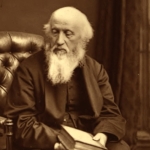for John
At a party I spy a handsome psychiatrist,
And wish, as we all do, to get her advice for free.
Doctor, I’ll say, I’m supposed to be a poet.
All life’s awfulness has been grist to me.
We learn that happiness is a Chinese meal,
While sorrow is a nourishment forever.
My new environment is California Dreamer.
I’m fearful I’m forgetting how to brood.
And, Doctor, another thing has got me worried:
I’m not drinking as much as I should . . .
But they won’t do, the tensions of every day,
The rub, the minor abrasions of any two
Who share one space. Ah, there’s no substitute for tragedy!
But in this chapter, tragedy belongs
To that other life, the old life before us.
Here is my aphorism of the day:
Happy people are monogamous.
Even in California. So how does the poem play
Without the paraphernalia of betrayal and loss?
I don’t have a jealous eye or fear
And neither do you. In truth, I’m fond
Of your ex-mate, whom I name “my wife-in-law.”
So laugh we do, in what Cyril Connolly
Has called the endless, nocturnal conversation
Of marriage. Which may be the best part.
Darling, must I love you in light verse
Without the tribute of profoundest art?
Of course it won’t last. You will break my heart
Or I yours, by dying. I could weep over that.
But now it seems forced, here in these heaven hills,
The mourning doves mourning, the squirrels mating,
My old cat warm in my lap, here on our terrace
As from below comes a musical cursing
As you mend my favorite plate. Later of course
I could pick a fight; there is always material in that.
But we don’t come from fighting people, those
Who scream out red-hot iambs in their hate.
No, love, the heavy poem will have to come
From temps perdu, fertile with pain, or perhaps
Detonated by terrors far beyond this place
Where the world rends itself, and its tainted waters
Rise in the east to erode our safety here.
Much as I want to gather a lifetime thrift
And craft, my cunning skills tied in a knot for you,
There is only this useless happiness as gift.




















Comment form: